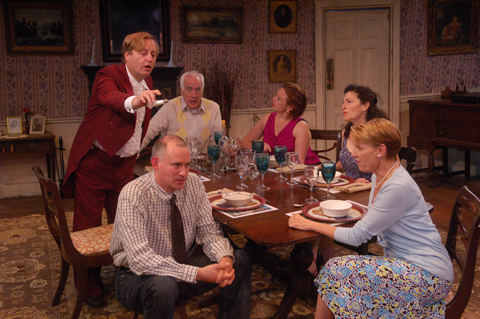
JUST RIGHT You’ll be laughing too hard to worry whether Ayckbourn is as good as Albee or Pinter. |
Alan Ayckbourn has been often dismissed as the British Neil Simon. He's also been hailed as a playwright of such acute insight that, if you look beyond the laughs, he deserves to be mentioned in the same critical breath as Harold Pinter.
Don't expect the Gloucester Stage Company production of Table Manners (through July 3) to settle the debate. The first in Ayckbourn's "The Norman Conquests" trilogy doesn't have the heft of a Pinter or Albee dissection of contemporary mores, but chances are you'll be laughing too hard to care. Pinter shminter.
Ayckbourn's trilogy was revived by the Old Vic in a production that traveled to New York a year ago to rave reviews, proving there was plenty of life in the these '70s sex farces. Gloucester artistic director Eric Engel pounced on the property — and, showing even greater wisdom, he surrounded Broadway veteran Lindsay Crouse with as merry a band of farceurs as you're going to find in the Boston area.
Sarah (Crouse) and her hubbie — Richard Snee is both delightfully acerbic and delighfully clueless as Reg — have returned to the family manse, where his off-stage mother resides with his sister, Annie (totally inhabited by Sarah Newhouse, whose bedraggled weariness is smartly matched by Jenna McFarland Lord's fading dining-room set). Much to Annie's surprise, she's being wooed by two lads: her long-time companion, a veterinarian played with perfect deer-in-the-headlights lack of flair by Barlow Adamson, and the beleaguered if manipulative Norman (he of the conquests), with Steven Barkhimer having the time of his life — which is saying something, given his comedic skills. And let's not forget Jennie Israel as Norman's icy wife, Ruth. When she and Crouse go after each other as dueling sisters-in-law, they might as well be Lear's Regan and Goneril. Both actresses make joylessness dyspeptically joyful — Israel in her near-sighted vanity, Crouse in her perplexed primness.
Not that this is tragedy. The women are the British equivalent of Wendy Wasserstein's Sisters Rosensweig, even if one's an in-law — three women battling over what constitutes rational behavior in an irrational world. In this case, the lovelorn trio were passed over by the sexual revolution of a decade earlier, so they're particularly susceptible to Norman's canoodlings.
But in Barkhimer's expert hands — in fact, his entire body language is great — he's as much Don Quixote as Don Juan, tilting against windmills of middle-class propriety in a way that makes sexual success and failure seem like pretty much the same thing. If Barkhimer's the one most likely to send you into a giggle fit — particularly in a tuxedo that looks more like a bunny suit — the other five certainly hold their own with their pregnant pauses and neurotic implosions. If individual credit is to be given, then, it has to start with Engel's direction, which is witty and lively without being overly manic — just right for the material.
And how good is that material? In the end, Ayckbourn's characters are as desperate for fulfillment as Pinter's or Albee's. The difference is that I've never seen a production of his work that breaks my heart or haunts my dreams.
The best productions, though, do make me laugh, and that's enough on a hot summer day. Perhaps — particularly since the 1977 British TV adaptations of the "Conquests" plays (with Tom Conti as Norman) are hard to find on DVD — these six actors can be rounded up next summer for the other two parts of the trilogy, which are set in different rooms of the family house. Call it the Gloucester Conquests.